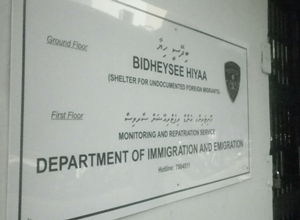The US government has signed a Memorandum of Understanding (MOU) with the Maldives government to provide it with a border system after several years of uncertainty and legal wrangling over the future of the country’s immigration controls.
Defence Minister Mohamed Nazim and US Ambassador to Sri Lanka and the Maldives Michele J Sison signed an MOU that will see a US technical team coming to the country next month to begin work on planning and implementing a new border system, according to local media. The system is scheduled to be installed by June this year.
Speaking to Minivan News , Immigration Controller Dr Mohamed Ali said it was too early to tell if the new border controls would be a direct replacement for the system provided by Malaysia-based IT group Nexbis. Nexbis is currently awaiting a decision by higher courts in the Maldives over whether anti-corruption authorities have the right to terminate its agreement with the government.
“We will have to see [what the agreement means for the government’s concession agreement with Nexbis]. Details need to be worked out,” stated Dr Ali, who did not elaborate further.
Immigration sources had told Minivan News earlier this month that the country faced a potential return to “pen and paper” border controls should the government be made to cancel its agreement with Nexbis without an adequate replacement.
The Nexbis border control system is still presently in use by immigration officials at Ibrahim Nasir International Airport (INIA), after the Supreme Court issued an injunction halting the scrapping of the controversial system by parliament.
Cost-free system
Defence Minister Nazim said that the system proposed under the MOU would be provided free of charge to the Maldives in a move he estimated would save the country MVR500 million (US$35 million), according to Sun Online.
Local media reported that the border controls would be based around its Personal Identification Secure Comparison and Evaluation System (PISCES). The same technology is reported to be used not only at US airports, but in a number of other countries including Pakistan, Afghanistan, Iraq and Thailand.
Maldivian staff are also expected to receive training on using the biometric-based system, as well as assistance with any expansion to the system in future, Sun Online has reported.
Prior to the announcement of the MOU, former Immigration Controller and now State Defence Minister Ilyas Hussain Ibrahim was quoted in local media as raising concerns that US involvement in the border control system would allow the country to exert its influence on Maldivian affairs.
Ilyas told the Channel News Maldives publication that the system would serve to provide a “door for American influence” by allowing the US to take control of the system and use it to locate foreign nationals whenever it wished.
When contacted by Minivan News today, Ilyas said he did not have any comments on the matter as he was no longer involved with the immigration department, and requested any questions be forwarded to Defence Minister Nazim.
However, Nazim asked that any questions regarding the system be sent to him by email. Minivan News was awaiting a response at time of press.
Earlier this month, outgoing Indian High Commissioner Dnyaneshwar Mulay formally handed over a new Advance Passenger Information System (APIS) to immigration authorities at INIA that was designed to provide passport information and other details of incoming travellers before their arrival.
The system was not intended to be a direct replacement for the existing border control system provided by Nexbis, authorities said at the time.
Nexbis
Nexbis is currently involved in legal wrangling over whether the Maldives’ Anti-Corruption Commission (ACC) has the power to compulsorily request the government to cease all work in relation to the border control system agreement.
While refuting allegations of any corruption or wrongdoing in being awarded a contract under the previous government to install and operate a border control system for the Maldives, Nexbis earlier this year said it would not rule out criminal involvement behind attempts to “sabotage” its contract with the government.
However, a source with knowledge of current immigration practices had previously said no alternative border control system was available should the government terminate its concession agreement with Nexbis.
“So far we don’t have any alternative to the [Nexbis] system going forward. We are using the system and waiting for the courts to decide. However, if the court decides [in favour of the ACC], we will need a new system in place,” the source told Minivan News. “Without [an alternative], the system would go haywire. A replacement would have to be found. We cannot go back to the 1970s and just use books and paper.”
Minivan News was awaiting a response on the MOU from Nexbis’ local legal representatives at time of press.
Human trafficking
The MOU has been signed at a time when the Maldives has come under increasing scrutiny regarding its immigration control.
The country has appeared on the US State Department’s Tier Two Watch List for Human Trafficking for three years in a row.
Back in January this year, the Ministry of Foreign Affairs inaugurated an initiative aimed at raising awareness of human trafficking issues in the Maldives.
Despite these commitments, the Human Rights Commission of Maldives (HRCM) has accused state and private sector employers in the country of lacking consistency in their efforts to address human trafficking, preventing “real” change in controlling illegal migration.
